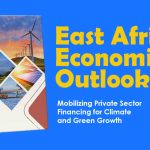Launch of the AfDB African Economic Outlook 2023 Report on “Mobilizing Private Sector Financing for Climate and Green Growth in Africa”

During its annual meetings in Egypt in late May 2023, the African Development Bank (AfDB) launched the 2023 edition of its flagship African Economic Outlook (AEO) report. Each year, the African Economic Outlook report provides compelling, up-to-date evidence and analysis that informs and supports Africa’s policy decision-makers, the private sector and the international community. The 2023 report shares the same theme as the Annual Meetings: Mobilizing Private Sector Financing for Climate and Green Growth in Africa. While highlighting the challenges, the 2023 African Economic Outlook mainly focuses on opportunities to unlock private investments and know-how and tap the continent’s vast natural capital to combat climate change and spur the transition to green growth.
Regarding Africa’s performance, the report notes that Africa’s green growth index score was only 48.2 on average between 2010 and 2021, falling behind East Asia and the Pacific; Latin America and the Caribbean; North America; Europe and Central Asia. Further, across all green growth opportunities: green trade, green employment, green innovation, and green investment, Africa lags all other regions.As to private sector financing for climate and green growth in Africa, the report notes that out of the $29.5 billion of climate finance flows to Africa in 2019/2020, private climate finance accounted for only 14% or $4.2 billion; the lowest share in the world. Further, the report notes that private climate finance flows to Africa will need to increase by up to 36% annually to close the estimated climate finance gap by 2030.
Notably, the Report also sets out various policy recommendations and key actions that different stakeholders could take to accelerate private sector investments in climate and green growth in Africa. First, national governments are called upon to enact and implement key policies that improve the macroeconomic environment of countries, de-risk their markets, and encourage private sector financing for climate and green growth. Recommended policies include anti-inflation monetary policy, coordinated debt treatment, expanded use of local currency in national and intra-regional trade to reduce currency risks etc.Second, recommendations for Multilateral Development Banks (MDBs) and other Development Finance Institutions, include to: (i) align their operations with the Bridgetown Initiative (ii) expand concessional financing and grants for capacity building; (iii) provide more risk agnostic, catalytic capital (e.g., guarantee instruments); (iv) revisit risk appetite (v) reduce profitability targets etc. Finally, Private Sector Actors, Rating Agencies, and the International Community are called upon to exercise market leadership and stewardship for climate and green investment in Africa, noting that it is in their common interest to fast-track climate resilience and green growth transitions.
Borderless. Seamless
At CLA, we are passionate about Africa and our purpose is to grow Africa’s economies, people, industries and markets.
All Insights
All rights Reserved © Citadel Law Africa (CLA) , 2026
Privacy Policy | Designed by sinosoft.guru

